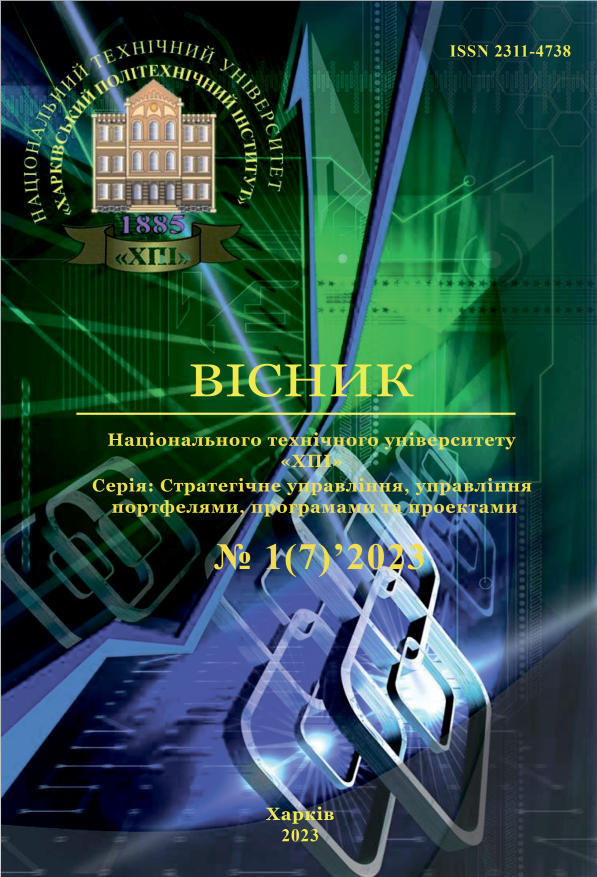ATTRIBUTABLE TRAIT OF THE BEHAVIORAL COMPETENCE OF A PROJECT MANAGEMENT SPECIALIST
DOI:
https://doi.org/10.20998/2413-3000.2023.7.7Keywords:
project management, behavioral competencies, educational training of specialists, professionally significant traits, self-confidence, self-confidence, self-assessment, decision-making, efficiencyAbstract
The subject of the article is the defined concept of self-confidence as one of the attributes of a project manager, which affects the ability to successfully complete the tasks provided by the project. The purpose of the article is to reveal the role and meaning of self-confidence as an attribute of the personality of a project management specialist, primarily a project manager, as well as to substantiate the possibilities and conditions for the purposeful development of this trait. The task of the research is to determine the conditions and tools for the development of self-confidence as an important behavioral competence of a project management specialist. To reveal the nature of the dynamic character of a person's self-confidence as a specific mental formation and to show that this opens up the possibilities of consistent and purposeful development of self-confidence. Research methods include, firstly, the analysis of the role of self-confidence as an attributive quality in the system of behavioral competencies in the process of forming an effective project team. Secondly, determination of confidence indicators of the project manager and the project team as a whole using the methods of cognitive theory and expert evaluations. Thirdly, the identification of traits and qualities that determine self-confidence using methods and mechanisms of project management, pedagogy and psychology. The results. The experience of self-confidence development of future project management specialists is analyzed. The need to include professionally significant personal traits and qualities in the general system of professional training of project management specialists is substantiated. The meaning and meaning of the phenomenon of self-confidence as one of the attributes of a project manager is revealed. It is substantiated that the development of confidence in team members and the leader's confidence in his project team affects the ability to successfully complete the tasks provided for by the project. Conclusions. First, self-confidence is a specific type of the more general concept of confidence as a psychological state of a person in which he considers certain propositions to be true and does not assume doubts about the possibility of rejecting them or refuting them. Secondly, self-confidence is a person's awareness and experience of his abilities and opportunities, adequate to the goals and tasks that appear before him or that he himself sets for himself, his life and activities. Thirdly, the formation and development of self-confidence of future project management specialists can be carried out quite effectively both through the purposeful use of trainings, business and role-playing games, analysis of problematic situations, etc., and through providing them with convincing advice and recommendations regarding the need to make appropriate changes in their character, behavior and relationships with other people. Fourthly, it is expedient for teachers to identify the level of self-esteem and demands of students, compare it with the real level of competence of each of them, and produce effective, sufficiently substantiated consultations and recommendations for personal development based on an individual approach. We consider enrichment of the material by analyzing the practical experience of graduates' professional activities in the field of project management as further research in the considered direction.
Downloads
Published
Issue
Section
License

This work is licensed under a Creative Commons Attribution-NonCommercial-ShareAlike 4.0 International License.
Our journal abides by the Creative Commons copyright rights and permissions for open access journals.
Authors who publish with this journal agree to the following terms:
Authors hold the copyright without restrictions and grant the journal right of first publication with the work simultaneously licensed under a Creative Commons Attribution-NonCommercial-ShareAlike 4.0 International License (CC BY-NC-SA 4.0) that allows others to share the work with an acknowledgement of the work's authorship and initial publication in this journal.
Authors are able to enter into separate, additional contractual arrangements for the non-commercial and non-exclusive distribution of the journal's published version of the work (e.g., post it to an institutional repository or publish it in a book), with an acknowledgement of its initial publication in this journal.
Authors are permitted and encouraged to post their published work online (e.g., in institutional repositories or on their website) as it can lead to productive exchanges, as well as earlier and greater citation of published work.

